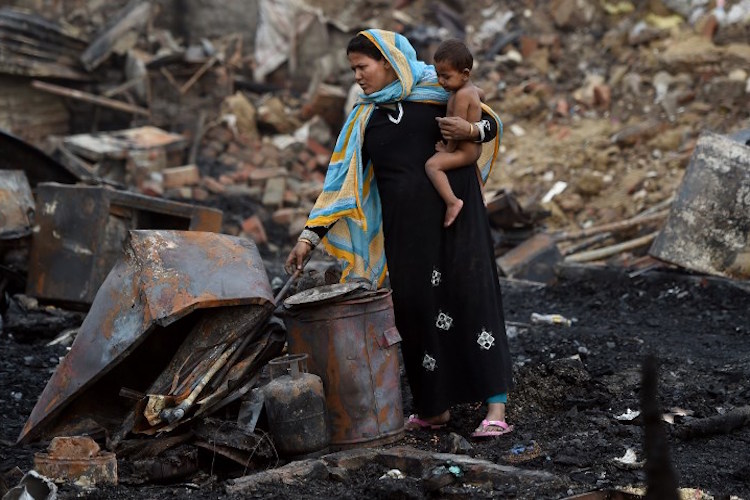Hindu groups heap pressure on govt to oust refugees but their safety still far from guaranteed in Myanmar

Rohingya refugees look for their belongings in New Delhi on April 16, , following a fire that broke out at their camp the day before that left around 200 people homeless. The refugees living in New Delhi have fled persecution in Myanmar, with their numbers increasing following a brutal crackdown starting in September 2017 that saw hundreds of thousands pouring into neighboring Bangladesh. (Photo by Money Sharma/AFP)
May 8, 2018
Rohingya Muslim refugees are fretting for their safety as India accelerates its move to repatriate them to Myanmar, the Buddhist-majority nation they began flooding out of last August following widespread violence.
India’s external affairs minister, Sushma Swaraj, is set to visit Myanmar from May 10-11 as India is expected to ramp up its assistance in facilitating the return of the refugees from Bangladeshduring the trip.
Her visit comes on the heels of a May 1 visit by a delegation from the U.N. Security Council during which they urged Myanmar to improve the security conditions for the return of thousands of refugees, who fled northern Rakhine State after military-led violence.
The U.N. council wants Myanmar and Bangladesh to speed up the repatriation process, which both nations agreed to start in January.
But plans were delayed as Myanmar found that the documents filed by the refugees did not match those agreed by the two countries.
However, the Rohingya in India say they are apprehensive if they are deported as demanded by some Hindu groups in India and Bangladesh.
“The announcements and assurances given the world over to the Rohingya are meaningless unless the Myanmar government treats us as their own people and stops unleashing terror against the community,” said Shafeeq-ur- Rahman, a Rohingya living in a refugee camp near New Delhi’s Madanpur.
An estimated 700,000 Rohingya have fled their native Rakhine State following violence and discriminatory treatment. The Myanmar government considers them migrants from Bangladesh, where they also face discrimination.
“We left to save our lives and now we are being asked to go back without any assurance from the Myanmar government. Who knows what they will do to us once we return to our homes,” Rahman told ucanews.com.
Rahman, who runs a roadside grocery shop in South Delhi’s congested Madanpur Khander, came to India via Bangladesh following the August 2017 violence, which he claims was spearheaded by the Myanmar military.
“Who would want to leave their home and live the life of a refugee? We just want our children and our women to be safe. That’s why we’ve taken shelter in various places. We won’t go back until our safety is guaranteed,” Rahman said.
Myanmar has for years denied the Rohingya citizenship, accusing them of being illegal immigrants from Bangladesh. Bangladesh says the Rohingyas are not its nationals.
Around 40,000 Rohingya Muslims fled to India over the past decade, of which 16,500 are registered with the U.N.’s refugee agency.
Taseem-un-Nisa, a Rohingya woman who has been living in India as a refugee for the past two years, told ucanews.com that ethnic persecution is still rampant in her homeland.
“The Myanmar government doesn’t even accept us,” she said. “For Bangladesh, we’re nothing but refugees. If we are sent back to Myanmar, we will be exposed to the same cycle of violence and mayhem, and bloodshed will become the order of the day.”
Meanwhile, pro-Hindu groups say India should take steps to deport the Rohingya as soon as possible.
Udhay Chand, head of the pro-Hindu Duggar Pradesh Party, told ucanews.com there “is no reason why India should continue host the refugees.”
Chand, an active supporter of the anti-Rohingya campaign in the northern Indian state of Jammu and Kashmir, said the government has failed to handle the Rohingya issue well by failing to organize refugee camps near the border with Myanmar, as mapped in the guidelines of the U.N. resolution.
“This has allowed refugees to scatter across the entire country, especially in the Jammu region, and they have become a nuisance for everyone,” Chand said.
Various Hindu groups have expressed concern the Rohingya are increasing India’s security threat as they could be targeted for radicalisation by Islamic terrorists.
The Rakhine crisis has triggered warnings of extremist violence around the region as organizations like Al-Qaeda urge followers to avenge the downtrodden Muslims.
However, for Javaid Ahmad Turabi, a Muslim cleric and general secretary of Tableeb-ul-Haq, the issue merits consideration from humanitarian perspective above all.
“There are women and innocent children living in these refugee camps in India. Come what may, they shouldn’t be sent back to a place where they faced persecution of the worst kind,” Javaid said.
He added that international rights organizations must continue to monitor the situation in a bid to ensure no Rohingya are killed.
“Till then, there won’t be any solution to this problem,” the cleric said.
